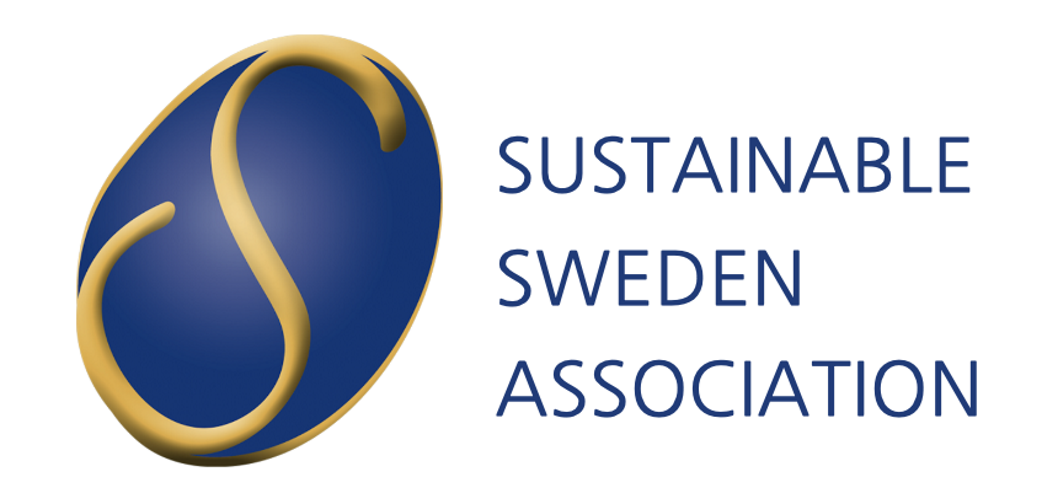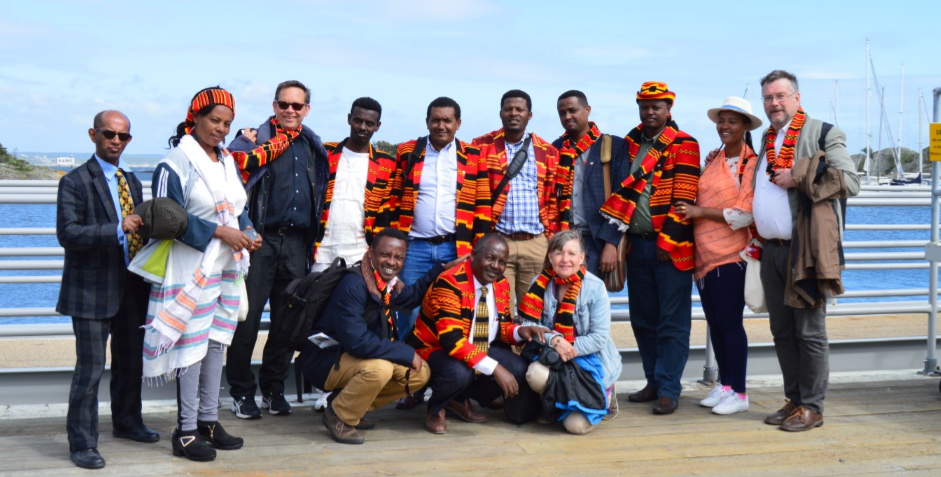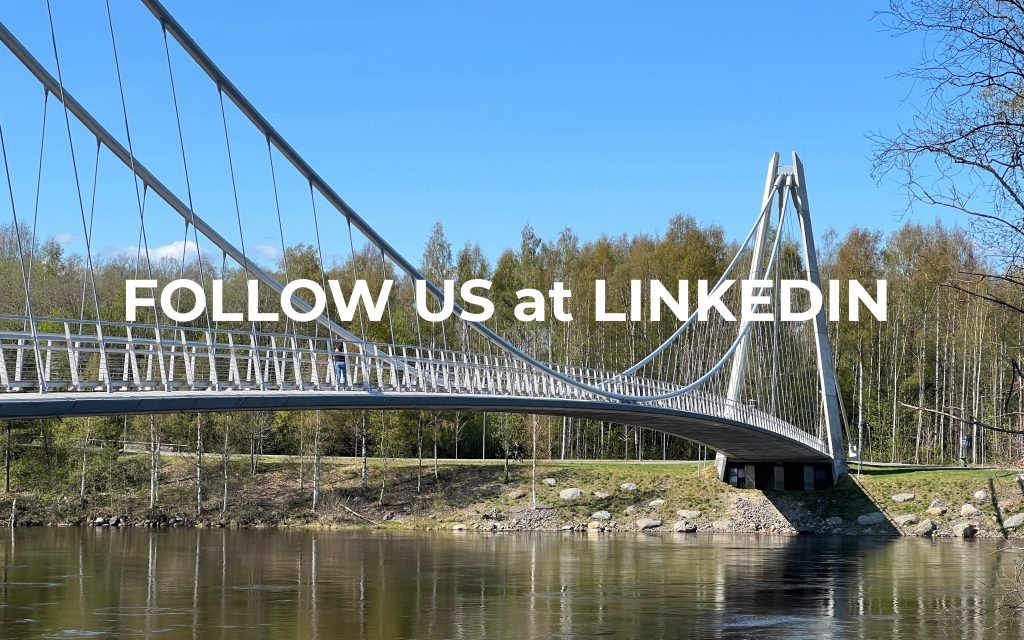From the 28th of May to the 5th of June, Sustainable Sweden welcomed an Ethiopian delegation from Arba Minch, one of the 14 cities participating in the Eco-municipality Program in Ethiopia, supervised by SSDE. The delegation was composed of 9 people, members of the Goma Gofa Zone, the Arba Minch Municipality and the Arba Minch University, three major actors in the sustainable development project in Arba Minch. This Tour was the occasion for them to observe longstanding eco-municipalities from Southern Sweden (Falkenberg, Gothenburg, Stockholm) and learn from their practices.
Sunday, the 28th of May
Arrival at Sörby Naturhälsogård (an eco-tourism site) after a long journey from Ethiopia.
Monday, the 29th of May
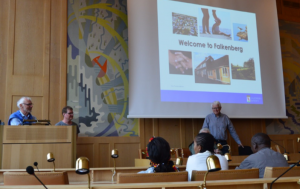 In the morning, the participants went the Town Hall of Falkenberg to attend a presentation of the eco-municipality by Daniel Helsing (Responsible for Sustainable Planning). They learned about the characteristics of the city and the way the municipality deals with issues such as the energy resources, and had the opportunity to ask questions. Then they visited a biogas plant of Falkenberg, where farm and household wastes are processed. Jonas Simonsson, the owner of the plant, answered their many questions.
In the morning, the participants went the Town Hall of Falkenberg to attend a presentation of the eco-municipality by Daniel Helsing (Responsible for Sustainable Planning). They learned about the characteristics of the city and the way the municipality deals with issues such as the energy resources, and had the opportunity to ask questions. Then they visited a biogas plant of Falkenberg, where farm and household wastes are processed. Jonas Simonsson, the owner of the plant, answered their many questions.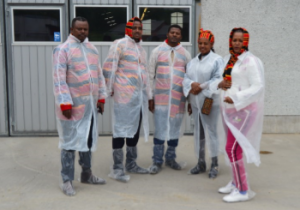
In the afternoon, the participants went to VIXA office, a consulting firm and agro center, in order to learn more about sustainable agriculture. There they met Pauliina Jonsson, an horticulture expert who shared her experiences as a consultant for farmers. Then they visited an organic farm producing milk, around 20km away.
Finally they discovered Ästad Vingård, an old traditional farm which 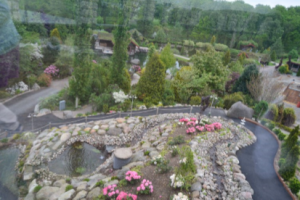 was gradually transformed in an hotel complex, constantly evolving (it has now a restaurant, a spa and an organic vineyard). The buildings, in their architecture and their materials, as well as the energy production on the site, have been thought to be as environmental-friendly as possible. This hotel complex was a great example of eco-tourism that could inspire the participants to the Tour.
was gradually transformed in an hotel complex, constantly evolving (it has now a restaurant, a spa and an organic vineyard). The buildings, in their architecture and their materials, as well as the energy production on the site, have been thought to be as environmental-friendly as possible. This hotel complex was a great example of eco-tourism that could inspire the participants to the Tour.
Tuesday, the 30th of May
The program of the day consisted in visiting the water treatment plant of Halmstad, the regional capital of Halland. The participants were welcomed by engineers in water related issues, who made a series of presentation. The participants were able to learn a lot about the issues of water (such as water distribution, sewage net, waste/surface/ground water treatment, how to deal with the risks of contamination, etc.) and to share their own experience on the topic.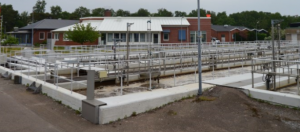
In the afternoon they went to the regional administration office to attend a presentation of EMC (Center for Energy and Environment). EMC is a capacity center which is owned by a network of local business and organizations. It’s a business initiative that makes compagnies collaborate on energy, environmental and climate issues, mostly in Halland. EMC’s aim is to be a driving force in regional change toward sustainability and climate-efficient business.
Wednesday, the 31st of May
On Wednesday, the delegation travelled to Gothenburg. From there, they went on a boat trip to Styrsö and the 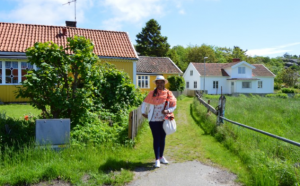 archipelago of Gothenburg. Einar Hansson, an experienced eco-guide, gave them a sightseeing tour of the
archipelago of Gothenburg. Einar Hansson, an experienced eco-guide, gave them a sightseeing tour of the
island of Styrsö, which provides good examples of sustainable development : the island uses no fuel, no carbon, but uses waste as a resource, etc. This island is a local community, a village, but is still part of the city Gothenburg. It is a great example of rural sustainable development at the lowest administrative level (which can be compared to the ethiopian Kevele), as well as a model of integration between rural area (Styrsö) and urban area (Gothenburg). This cooperation between rurality and urbanity is of great importance on the path to sustainability, for example concerning the question of food or energy.
Thursday, the 1st of June
In the morning, the delegation travelled to the University of Gothenburg – taking a bus working only on solar energy. They met Gunnar Köhlin, an economist who has worked in Ethiopia for 20 years, and Malin Gustafsson, coordinator for the Focali Project (a forest, climate and livelihood research network). They attended several presentations, one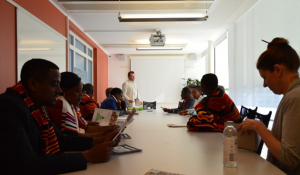 about the Focali Project and the issues it’s working one, one about the Environmental and Climate Research Center of EDRI (Ethiopian Development Research Institute) and the challenges that Ehiopia has to face, by Gunnar Köhlin, and one about “Policy Instruments for Realising a green economy in Ethiopia”, by Thomas Sterner from the University of Gothenburg – who was impressed by the radical goals of the Ethiopian Government. All of these presentations gave the participants precious tools to think the issue of sustainable development in Ethiopia. This morning also allowed them to meet other university people and create a connection between Arba Minch University and Gothenburg University.
about the Focali Project and the issues it’s working one, one about the Environmental and Climate Research Center of EDRI (Ethiopian Development Research Institute) and the challenges that Ehiopia has to face, by Gunnar Köhlin, and one about “Policy Instruments for Realising a green economy in Ethiopia”, by Thomas Sterner from the University of Gothenburg – who was impressed by the radical goals of the Ethiopian Government. All of these presentations gave the participants precious tools to think the issue of sustainable development in Ethiopia. This morning also allowed them to meet other university people and create a connection between Arba Minch University and Gothenburg University.
After lunch, the delegation went to Mistra Urban Future (MUF), a capacity centre partner of UN habitat, greatly involved in achieving some of the goals stated by the UN. The research centre focus on academic works and research on urban planning and sustainability issues. Its main tool is action research, that is to mean they use academic knowledge for concrete actions, trying to solve problems and by the same time to learn from those actions. This process involves a global vision and the active participation of the members concerned by the change situation.
The Mistra Urban Futures organisation is made up of five local interaction platforms, spread in five cities around the world: Cape Town (South Africa), Gothenburg (Sweden), Sheffield-Manchester (UK), Kisumu (Kenya), and Malmö (Sweden). It promotes mutual learning and leads projects in those five cities. For example, Stina Rydberg (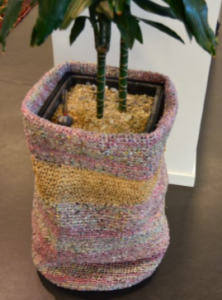 head of the project Stadslandet, focusing on Urban/Rural synergies) gave a presentation on the Urban-Rural Gothenburg project, which used a bottom-up approach – the citizens were consulted about what problems should be solved in the city. A lot of projects were done in Kisumu (Kenya) too. Maria Nyström (Professor at East African Urban Academy), presented one example from Kisumu of sock recycling – transforming it in planter box for example. Eva Maria Jernsand (PhD) presented the ‘Inclusive Place Branding”, an interdisciplinary research focused on mobilization and involvement of the community in the place branding.
head of the project Stadslandet, focusing on Urban/Rural synergies) gave a presentation on the Urban-Rural Gothenburg project, which used a bottom-up approach – the citizens were consulted about what problems should be solved in the city. A lot of projects were done in Kisumu (Kenya) too. Maria Nyström (Professor at East African Urban Academy), presented one example from Kisumu of sock recycling – transforming it in planter box for example. Eva Maria Jernsand (PhD) presented the ‘Inclusive Place Branding”, an interdisciplinary research focused on mobilization and involvement of the community in the place branding.
Those examples, and especially the case of Kisumu, inspired a lot the participants of the Tour. The MUF capacity center could someday become a partner of the Ethiopian Eco-municipalities.
The day ended by a wonderful dinner with the Ambassador of Ethiopia, representatives from Sekom (Swedish Association for Ecomunicipalities) and representatives from the Region.
Friday, the 2nd of June
On Friday, the delegation was brought to the Ekocentrum head office in the city of Gothenburg. Its members attended a presentation of this capacity centre which could be a model for an Ethiopian capacity centre on sustainability. Indeed, Ekocentrum is an arena for sustainability that provides training, presentations or meetings in order to gather and spread knowledge about sustainability.
They then had a workshop together with experts and representatives from the Sekom and from Eco-municipalities, as well as the Ambassador of Ethiopia. There they attended several presentations that explained deeper the concept of eco-municipality and the different projects in Sweden and in Ethiopia.
Saturday, the 3rd of June
On that day, the participants definitely left any type of rural area to go the the Swedish capital and bigger city : Stockholm. They enjoyed a sightseeing of the capital (including the Mall of Scandinavia, claimed to be the largest in the whole of Nordic countries) and a dinner with the Ethiopian Ambassador.
Sunday, the 4th of June
On this last day of the Tour, the participants enjoyed a sightseeing of the Royal Canal on boat and visited the old neighbourhoods of Stockholm. They attended an ending work-shop to share their reflections on the past week, and travelled back to Ethiopia after dinner.
